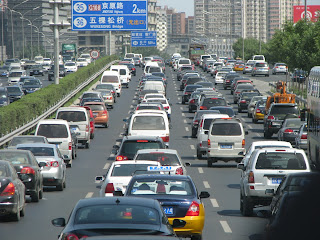The brakes squealed in complaint as our
rickshaw maneuvered the sharp curve from one alleyway to the next as
we made our way through the narrow side streets of the Hutong. Barely
slipping through the passages ourselves, around the next curve came
an oncoming rickshaw, our driver edged closer and closer to the
walls trying to avoid what was certainly going to result in a
collision of tangled wheels and tourists!
Earlier that morning our day began with
the usual buffet breakfast and a ride through the city. Our first
stop was a pearl factory outlet sponsored by the government.
Remember, this tour is partially subsidized by the Chinese government
in an attempt to develop tourism - the “smokeless industry.”
There will be 8,000 Canadians arriving in China this year, another
10,000 next year with 15,000 the year after and peaking at 30,000 in
2015. The industry is well organized with periodic stops at these
government factory outlets to promote spending for the benefit of the
local economies. A small price to pay for a visit of the nature we
are experiencing, unless of course Lucie happens to take a liking to
some of the magnificent pearls on display.
As it turned out, Lucie did find a very
attractive pearl bracelet that she was able to haggle into a even
more attractive price. The factory outlet was followed by a short
ride to our lunch stop for today.
Pictured below, a skyline of Beijing on
the way to the pearl outlet, a shot of some pearls on the half-shell,
and Lucie bargaining for her bracelet.
That afternoon, the residents of
Beijing are taking advantage of the beautiful blue skies and 90
degree weather to come to the most famous park in Beijing, the Summer
Palace. Thousands of people crowded the shore of the lake and the
walkways as we made our way through the grounds in search of the
favorite hideaway of the Empress Cixi, the last of the Dynasties true
leaders. This, the Chinese version of Camp David, is at once an
incredible reflection of a world from the past and a testament to
what drives a nation's citizens to revolution. One can't help but be
reminded of the decadence of Versailles in Paris, where the excesses
of the monarchs drove the peasants to revolt.
The walkway through the woods was
covered by a wooden roof that was adorned with 14,000 different
paintings.
Many different types of watercraft
could be seen on the lake such as this one adorned with a dragon.
This boat was made for Empress Cixi out
of marble, while it never actually sailed, many a wild party were
held aboard.
Our visit of the Summer Palace ended
with this decorative bridge.
From the Summer Palace we made our way
to visit a traditional Beijing Hutong. These are alleys formed by
lines of siheyuan, traditional courtyard residences. Many
neighborhoods were formed by joining one siheyuan to another to form
a hutong, and then joining one hutong to another. Hutongs date back
to the early 1400s and were where the Emperor's court lived. Today,
the residents are less fortunate, where many siheyuan are shared with
multiple families, up to as many as 12 in one.
Our visit of the Hutong was unique –
we road in a rickshaw through the alleys and streets. Although we had
many close calls, there were no collisions on our tour of this real
Beijing neighborhood.
Our last stop before dinner was the
Beijing Olympic Park where we saw the famous Bird's Nest Stadium.
Today it gets little use due to its enormous size – a capacity of
110,000. I couldn't resist a shot of the IBM building across the
street.
As we headed for our dinner, I caught a
shot of this ladies grocery bag. Apparently her family was in for a
tasty chicken-foot stew tonight!
Following are some interesting shots of
the citizens of Beijing...
Here are a couple shots of a busy day
in Beijing...
Time to say goodnight, tomorrow we
leave Beijing for the second major stop of our tour – Xi'an.































Bonjour Lucie et Andy!
ReplyDeleteQuel beau blog!
Profitez bien de votre voyage:
Monique Bourbeau